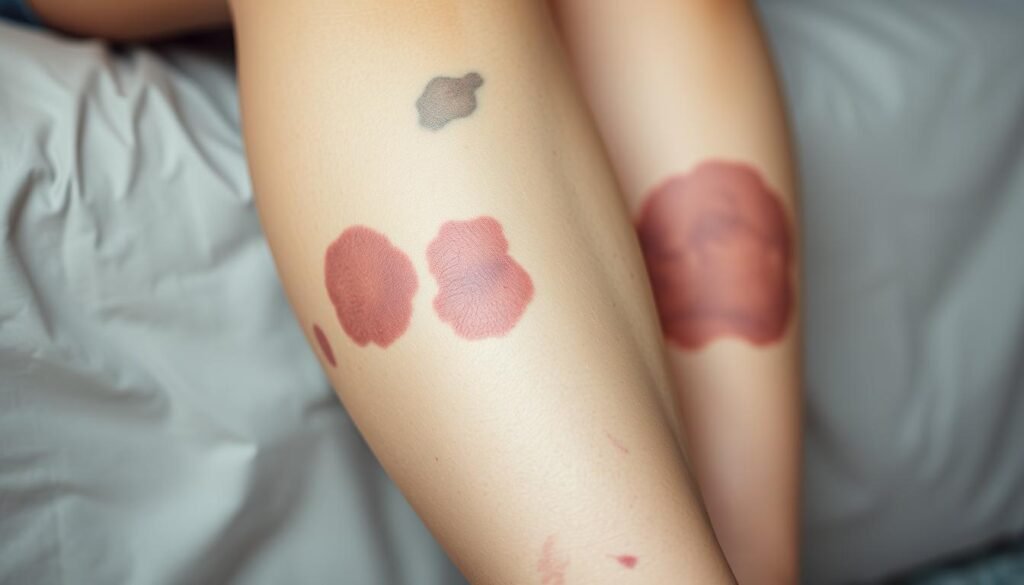Did you know that normal bruises last about two to four weeks? Yet, a sudden increase in unexplained bruises, especially on the legs, may hint at health problems. These problems need a doctor’s check-up. Unexplained bruises on legs and fatigue raise concerns for many, highlighting the need to grasp what causes these symptoms.
Nutritional gaps, immune system issues, and aging can all play a role. For instance, lack of vitamins or certain medicines might make bruising worse. Sometimes, these signs can point to severe health risks, especially with symptoms like heavy periods or looking pale. That’s why it’s key to understand what’s behind unexplained leg bruises and tiredness. Check more on unexplained bruising here.
Next, we’ll explore the reasons and consequences of these worrying signs.
Key Takeaways
- Often, unexplained bruising and tiredness need a doctor’s look.
- Getting older and some meds may make bruising easier.
- Lack of vitamins C, K, and iron can lead to more bruises.
- It’s critical to connect autoimmune issues with bruising for proper care.
- Spotting other symptoms early can help catch serious health issues.
- Pay attention to bruising patterns to manage health risks better.
Understanding Bruising
Bruising is common and happens when small blood vessels break. This allows blood into surrounding tissue, causing discoloration. People might get bruises from minor injuries, too much pressure, or hitting their skin hard. Knowing why bruises happen helps us understand when to get medical help.
What Causes Bruising?
Many things can make bruises more likely. Older people bruise more often because their skin is thinner and they have less fat to protect their blood vessels. Women bruise easier than men due to hormonal changes and skin differences. If your family members bruise easily, you might too.
Certain health issues and medicines can increase bruising. Problems with platelet function or too few platelets can cause more bruising. Medicines like blood thinners and aspirin affect clotting. Supplements like ginkgo biloba and fish oil might make bruising worse by thinning your blood.
The Role of Blood Vessels and Skin
The health of your blood vessels and skin affects bruising. As people age, their skin gets thinner and offers less protection. This makes it easier for blood vessels to damage. Health conditions such as liver disease or autoimmune disorders can weaken blood vessels and lead to more bruises.
Sometimes, bruises appear suddenly and without a clear reason. If large bruises don’t get better or keep showing up, a doctor should check them out. Blood tests can find clotting problems or other health issues causing the bruises. It’s important to pay attention to what your skin and bruising may be telling you about your health.
Unexplained Bruising on Legs and Fatigue
Unexplained bruising on your legs can be a sign of deeper health issues, especially if you also feel worn out. If you’re always tired, your bruising could point to a health condition. It means your body might be lacking something important or fighting an illness.
How Bruising Relates to Fatigue
Bruises on your legs and feeling tired often go hand-in-hand. This could be due to:
- Anemia: Low oxygen transport by the blood causes fatigue and more bruises.
- Nutritional Deficiencies: Not enough Vitamin C and K leads to more bruising and less energy.
- Kidney or Liver Disease: These conditions change your blood and can cause bruises and tiredness.
- Blood Disorders: Diseases like hemophilia or von Willebrand’s disease make you bruise easily and feel more tired.
Seeing the link between fatigue and bruises is important. Without the right help, these signs could mean you have a serious health condition. Be sure to get checked by a doctor.

Common Causes of Easy Bruising
Knowing why easy bruising happens sheds light on certain factors. Age, medication, and lack of vitamins are main reasons. These factors explain why some people get bruises easier than others.
Age and Its Effects on Bruising
As people get older, their skin gets thinner and bruises easier. This is known as age-related bruising. It’s especially common in those over 50, impacting even more folks as they reach 75. Thinner skin and less fat mean more bruises.
Medications That May Contribute to Bruising
Some medicines can make bruising more likely. Blood thinners, NSAIDs, and steroids affect how blood clots. People on these meds should be aware, especially if they bruise without a clear reason.
Vitamin Deficiencies Impacting Bruising
Vitamins C and K are crucial for blood vessels and clotting. Not getting enough can cause more bruising. If you bruise easily, checking your diet for these vitamins helps. Find out more on how vitamins support health here.
| Factor | Description | Prevalence |
|---|---|---|
| Age-related Bruising | Thinning skin and decreased fat cushioning | 12% of those over 50; up to 30% in those over 75 |
| Medication Effects | Blood thinners and NSAIDs impair clotting | Varies by individual; common among users |
| Vitamin Deficiencies | Lack of vitamins C and K affects clotting and vessel health | Common in those with poor dietary intake |

The Role of Blood Disorders
Blood disorders play a significant role in unexplained bruising. They affect parts of blood that heal wounds and form clots. These diseases can make bruising easier and carry risks.
Understanding Platelet Dysfunction
Platelet dysfunction harms the body’s ability to stop bleeding. Conditions like thrombocytopenia cause a lack of platelets, leading to more bruising. Platelets are crucial for clotting, starting the healing process for injuries.
People with platelet dysfunction often bruise easily, even from small bumps. It’s critical to recognize this and see a doctor for any strange bruising patterns.
Inherited Bleeding Disorders
Inherited disorders like hemophilia and von Willebrand disease make bruising easier and bleeding more likely. Hemophilia causes a shortage of clotting factors, leading to long bleed times. Von Willebrand disease lacks a clotting protein, causing bleeding issues too.
Those with inherited bleeding disorders should talk to their doctors for proper management. For more info on these conditions, check this resource.

| Blood Disorder | Characteristics | Symptoms |
|---|---|---|
| Thrombocytopenia | Low platelet count affecting clotting | Easy bruising, excessive bleeding |
| Hemophilia | Deficiency in clotting factors VIII or IX | Prolonged bleeding, easy bruising |
| Von Willebrand Disease | Deficiency of von Willebrand factor | Easy bruising, heavy menstrual bleeding |
Nutritional Deficiencies Linked to Fatigue
Nutritional deficiencies hugely influence fatigue and unexplained bruising. Vitamin C and K are vital. They help with skin health and keep our energy up.
Vitamin Deficiencies: Vitamin C and K
In the U.S., about 7% of adults don’t get enough Vitamin C. This lack can cause easy bruising, spots under nails, and tiredness. Those with poor diets, who drink too much, or have anorexia are more at risk. Signs like rough skin or weird hair might get better quickly once Vitamin C intake increases.
Vitamin K is key for blood clotting. Not having enough might mean you get bruised easily, especially where skin is thin. It’s important to have enough of both vitamins to avoid bruises and feel better overall.
Iron Deficiency and Its Effects
Iron deficiency is also a big deal, leading to fatigue. It can cause anemia, meaning not enough oxygen gets to your body parts. This often results in bruising. Cold hands or feet and strange bleeding could mean you need more iron. Eating foods rich in iron, with vitamins C and K, might help. Deficiencies often link together—fixing one might help fix others. For more information, check out this in-depth article.
Autoimmune Disorders and Their Impact
Autoimmune disorders affect many aspects of health, including bruising and fatigue. These diseases make the immune system attack healthy cells by mistake. This leads to symptoms like unexplained bruising. Autoimmune diseases also affect the blood, making bruising more likely. They add to feeling tired too.
How Autoimmune Conditions Affect Bruising
With autoimmune conditions, your immune system can harm platelets needed for blood clotting. Diseases like lupus lower platelet counts, causing more bruises. People with these illnesses bruise easily, even from small injuries. These bruises are easy to see.
Also, inflammation from these diseases makes you feel more tired. It can make everyday tasks harder to do.
Common Autoimmune Disorders to Consider
Here are some common autoimmune diseases that lead to more bruising and fatigue:
- Lupus: It mainly affects women aged 15 to 45. African Americans, Native Americans, and Asians see it more. 50 to 90 percent of people with lupus feel very tired.
- Sjögren’s Syndrome: Usually found in women over 40. It can cause fatigue and more bruising because it affects blood flow.
- Rheumatoid Arthritis (RA): Though it can happen at any age, it’s more common in older adults. RA can make you tired and bruise easily due to swelling in the joints.
- Psoriasis and Psoriatic Arthritis: These conditions are more likely in adults. They cause a lot of stress and swelling. This leads to more tiredness and bruising.
Liver Disease and Bruising
The liver is key to our body’s ability to stop bleeding. When it’s sick, we don’t make enough proteins for blood clotting. This leads to easy bruising. People with liver problems like cirrhosis are really prone to getting bruises.
How Liver Function Affects Bruising
A healthy liver makes proteins that help our blood clot. Diseases like cirrhosis, viral hepatitis, or alcohol damage slow this process down. This means more bruising and bleeding.
Poor liver function increases the chance of bruises and bleeding. This is a big problem for those with liver disease.
Additional Symptoms of Liver Disease to Watch For
We must notice other liver disease signs early. They help us act fast to get better. Look out for:
- Jaundice: The skin and eyes turn yellow from too much bilirubin.
- Ascites: The belly swells because it’s holding fluids.
- Cognitive difficulties: Toxins in the blood can make you confused or unfocused.
- Persistent nausea and vomiting: This happens when the liver can’t clean the blood well.
Seeing these signs means you should talk to a doctor soon. Finding liver disease early helps in treating it. So, it’s vital to watch for bruises and other signs of liver problems.
The Impact of Aging on Bruising
As people get older, their skin changes in many ways. These changes make them bruise more easily. Thinner skin, less fatty tissue, and other changes mean even small bumps can cause bruises. It’s crucial for older people to keep their blood vessels strong to avoid bruising.
Age-Related Changes in Skin and Blood Vessels
Our skin gets thinner as we age. This makes our blood vessels more likely to break, causing bruises. Women often see these changes more, which makes bruising more common as they get older. According to the Mayo Clinic, most bruises aren’t serious. But, it’s good to pay attention to new or unusual bruises. They could point to health problems like anemia or liver disease.
Preventive Strategies for Older Adults
There are ways to lower the chance of bruising in older adults. Such measures include:
- Improving lighting in common areas to prevent falls.
- Organizing living spaces to minimize obstacles and maintain clear pathways.
- Engaging in physical activities that bolster muscle strength and enhance stabilization.
- Adopting sun protection measures to shield the skin from damage.
- Monitoring the use of common over-the-counter medications that increase bruising risk.
By taking these steps, older adults can help their skin stay healthier. This makes it easier for them to avoid bruises.
Conclusion
Unexplained bruising on your legs, especially with a lot of tiredness, is a warning sign. This might mean you have health problems, from not eating right to serious blood issues. It’s important to get checked by a doctor if you see unexplained bruises. Catching problems early helps fix them faster, which is key for staying healthy.
Feeling very tired can be a sign of serious illnesses, like blood cancers. If bruises show up easily, it could mean your blood platelets are low. You should also watch out for other worrying signs. Things like changes in weight, stomach pain, or problems with your stomach could signal big health issues. This shows how crucial it is to pay attention to what your body is telling you.
To wrap up, understanding and acting on unexplained bruising and tiredness can save your life. Seeing a doctor for a proper check-up is super important. This helps figure out what’s wrong and how to treat it. Being aware and responding quickly can make a huge difference in your health and handling possible problems.